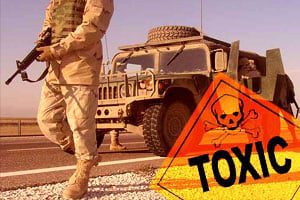
Soldiers returning from war zones in Iraq are beginning to report health complications similar to those reported by veterans of the conflict there in the early-1990s, giving more evidence to the validity of Gulf War Syndrome. According to a HuffingtonPost.com report, the toxic air over the deserts of war-torn Iraq provide a dangerous environment for […]
 Soldiers returning from war zones in Iraq are beginning to report health complications similar to those reported by veterans of the conflict there in the early-1990s, giving more evidence to the validity of Gulf War Syndrome.
Soldiers returning from war zones in Iraq are beginning to report health complications similar to those reported by veterans of the conflict there in the early-1990s, giving more evidence to the validity of Gulf War Syndrome.
According to a HuffingtonPost.com report, the toxic air over the deserts of war-torn Iraq provide a dangerous environment for U.S. and other soldiers, either from sand and dust storms, the toxins released during bomb blasts, and from their own behaviors. And as more soldiers return home from the war zone, the quality of their health has continued to deteriorate, giving renewed attention to the effects of Gulf War Syndrome.
In the early-90s, after homecomings for U.S. soldiers deployed during Operation Desert Storm in Iraq, an alarming number of soldiers began to develop serious and wide-ranging health problems. One Desert Storm veteran told HuffingtonPost.com that her symptoms of Gulf War Syndrome have ranged from lung disease and sleep apnea to a recent diagnosis of terminal breast cancer.
Getting insurance companies to recognize the effects of Gulf War Syndrome and to link those symptoms to their time in the service has proven difficult and frustrating, potentially preventing soldiers from receiving needed and life-preserving health care.
New research, combined with recent veterans returning home and experiencing mirror symptoms those those two decades ago, may provide some needed evidence for those veterans seeking help in treating their worsening conditions. A new study has determined that the air quality in and outside of the war zone is toxic, filled with dangerous metallic contents and even low levels of sarin gas, used in chemical warfare. These toxins are likely being propelled through the desert air by sand, kicked up during sand and dust storms or even by the movement of soldiers.
As tanks and troops move through the desert, they disturb the desert floor and push the sand into the air. Sand can stay in the air for days or longer than a week and U.S. soldiers don’t often wear facial covering to prevent them from breathing in this dangerous air.
Also making conditions worse is the Army’s practice of using open burn pits to rid themselves of any solid waste, including human feces. These pits are burned using jet fuel and while they’re supposed to remove evidence of soldiers being in an area, the toxins generated from the burn pits could be causing long-term harm to soldiers who likely breathe this into their lungs.


